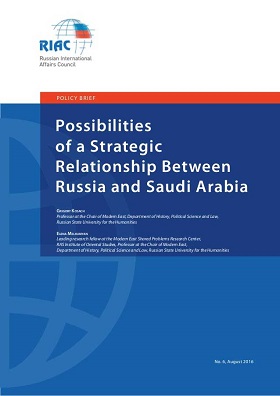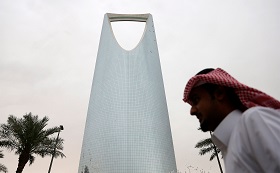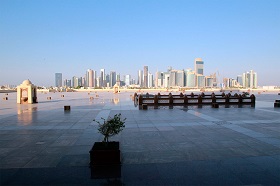One indication of the level of relations between the two countries are the ongoing preparations for the Saudi monarch’s upcoming visit to Russia, his first ever. Normally King Salman, 81, only graces the closest allies and most important partners with his presence.
The appointment of Mohammad Bin Salman Al Saud as Crown Prince of Saudi Arabia offers both new opportunities and new challenges to Russia.
Prince Mohammad’s approach towards Russia appears to be purely pragmatic. He aims to cooperate with Moscow wherever possible.
The current situation is quite complex in the context of Russia–Saudi Arabia relations. The politician in charge of Saudi Arabia’s foreign policies realizes the importance of cooperation with Russia, and is in fact interested in such cooperation. On the other hand, Prince Mohammad is known as a stern and decisive leader. He is unlikely to tolerate any open pro-Iranian steps that Moscow might take.
The appointment of Mohammad Bin Salman Al Saud as Crown Prince of Saudi Arabia offers both new opportunities and new challenges to Russia.
The appointment of the 31-year-old Mohammad Bin Salman Al Saud as Crown Prince of Saudi Arabia is a further confirmation of the enormous role the prince plays in managing the kingdom. Given the rather old age of the incumbent monarch, it is Prince Mohammad who will determine Saudi Arabia’s policy, including with regard to Russia.
Prince Mohammad is believed to be less conservative than his father. He is popular with the youth, who are tired of decades of gerontocracy. The prince advocates the modernization of the country, primarily through reducing the role of the clergy in state affairs and lowering the national economy’s dependence on oil.
Prince Mohammad’s liberal views (at least by Saudi Arabian standards) do not stop him from implementing a tough foreign policy. He maintains a firm stance with regard to Iran, the country which Riyadh views as a source of existential threat to Saudi Arabia. In particular, it was Prince Mohammad who made the decision on Saudi Arabia’s direct intervention in the civil war in neighbouring Yemen, an extremely untypical political move for the kingdom, which historically prefers to act through financial assistance and via its proxies.
Prince Mohammad is believed to have initiated the blockade of Qatar in June. The formal accusations of Qatar supporting terrorism are apparently just a pretext for Riyadh’s mounting dissatisfaction with Doha’s relations with Tehran, which have grown too friendly. It appears that the future Saudi monarch has decided, as is his wont, to set the record straight.
When it comes to Russia, Riyadh is in two minds. On the one hand, serious differences remain between the two countries on Syria. On the other hand, both Riyadh and Moscow welcomed the change of power in Egypt in 2013 and continue to jointly support President Abdel Fattah el-Sisi. In particular, there are reasons to believe that Egypt's massive procurement of Russian weapons was possible thanks to Saudi financial assistance to Cairo. Riyadh also seems to have appreciated Moscow’s restrained position on the Yemeni issue.
There is also mutual understanding with regard to the oil market. In spring 2017, the two countries agreed to lower oil production by 1.8 million barrels per day in order to keep prices up. This even prompted President of the Russian Federation Vladimir Putin to announce in late May that the coordinated actions of Moscow and Riyadh had helped “stabilize the global hydrocarbon markets.”
Prince Mohammad’s approach towards Russia appears to be purely pragmatic. He aims to cooperate with Moscow wherever possible. It was notable when the Prince personally came to Moscow a month ago and stressed that bilateral relations were “experiencing one of their best moments ever.” Putin commented in a similar vein: “We support political contacts, contacts between the defence ministries. We are working together to sort out difficult situations, including in Syria.”
One indication of the level of relations between the two countries are the ongoing preparations for the Saudi monarch’s upcoming visit to Russia, his first ever. Normally King Salman, 81, only graces the closest allies and most important partners with his presence.
Despite all this, it would be naïve to think that Russia–Saudi Arabia relations will develop in an exclusively positive way. For example, German media recently ran a statement allegedly made by Prince Mohammad to the effect that Russia poses a threat to Saudi Arabia, and that it would only take the Saudi army three days to destroy the Russian forces in Syria if need be.
The Prince’s office and the Ministry of Foreign Affairs of the Russian Federation immediately refuted the reports, but certain differences between the two countries do exist. Moscow continues to support President of Syria Bashar al-Assad. Because of Russia’s stance on Syria, the Arab world perceives it as an ally of Shiite Iran. Saudi Arabia, for its part, cooperates in Syria with varied Sunni groups whose aim is to change the power in the country.
Another potential source of discord are direct shipments of Russian arms to Iran, particularly of S-300 and other surface-to-air missile systems, which are capable of tipping the balance of forces in the region and stripping Saudi Arabia of its current aerial supremacy.
Finally, further development of bilateral ties will depend on Moscow’s position on the Qatari issue. Doha is evidently interested in Russian support, and Sheikh Tamim bin Hamad Al Thani, the Emir of Qatar, most likely told Putin as much during their recent phone conversation. However, Riyadh’s reaction to any attempts by Russia to intervene in the dispute between the Arab monarchies is going to be extremely negative. Saudi Arabia perceives the Persian Gulf as its exclusive zone of influence.
The current situation, therefore, is quite complex in the context of Russia–Saudi Arabia relations. The politician in charge of Saudi Arabia’s foreign policies realizes the importance of cooperation with Russia, and is in fact interested in such cooperation. On the other hand, Prince Mohammad is known as a stern and decisive leader. He is unlikely to tolerate any open pro-Iranian steps that Moscow might take.







